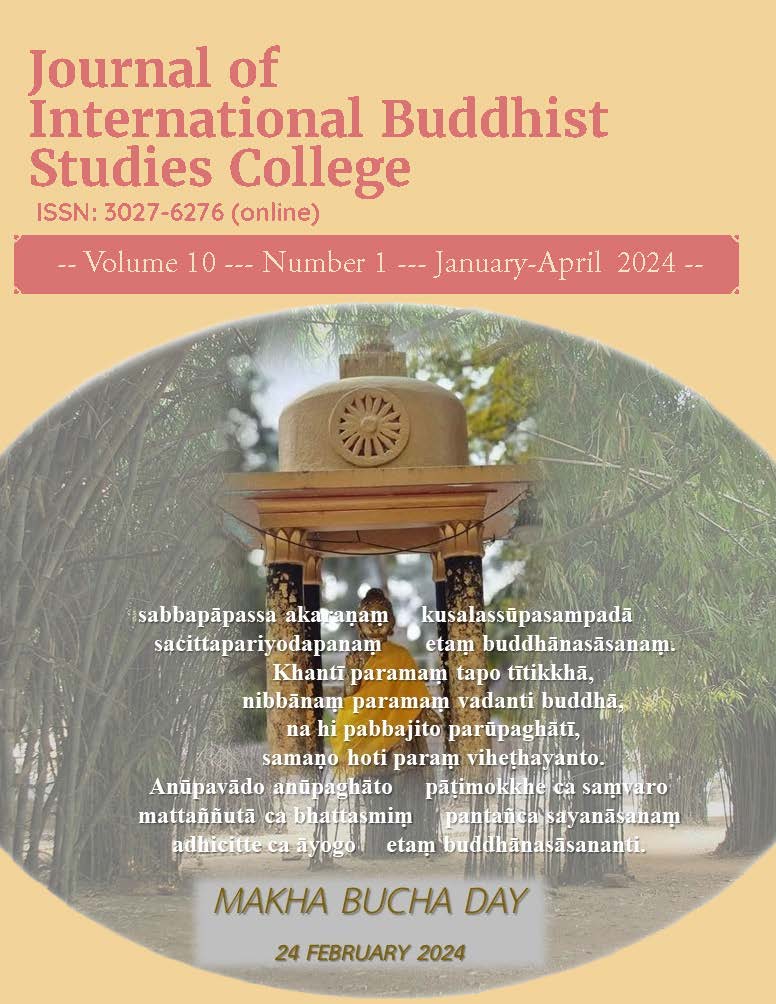Integrating Mahāsi Sayādaw’s Meditation Techniques for Effective Management of Guilt: A Comparative Study of Buddhist and Psychological Perspectives
Main Article Content
Abstract
This research article aims to: (1) study the concept of the feeling of guilt and its causes as mentioned in psychology and the Buddhist Scriptures, (2) examine the technique of meditation practice as taught by Mahāsi Sayādaw, and (3) propose the effective ways to deal with the feeling of guilt based on the technique of Mahāsi Sayādaw’s meditation practice. The research methodology is qualitative, documentary, and involves in-depth interviews.
The findings reveal that the feeling of guilt, denoted as kukkucca in Buddhist literature, is interpreted differently in the field of psychology compared to Buddhist texts. In psychology, it is considered a double-edged emotion, stemming from the notion of self and values, along with cognitive patterns and beliefs. Whereas, according to Buddhist doctrine, its nature is unwholesome, regardless of how it is explained, and unwholesome deeds that have been done, wholesome deeds that have not been done, ignorance, unsettledness of mind, and frequently giving careless attention to it are its causes. Notwithstanding the divergent interpretations, both psychology and Buddhism converge on the efficacy of mindfulness practice in coping with guilt. Mahāsi Sayādaw’s meditation technique offers a practical approach to mindfulness practice to help cope with guilt effectively. The effective ways of meditation practice that address guilt based on his teachings use the acronym LOVE, meaning: L: loving-kindness development, O: observing, V: vivid insight, and E: embracing change. Additionally, endeavoring to cultivate mindfulness and associating with good friends are also suggested to surmount possible obstacles during the implementation of this approach. By engaging in this process, individuals may calm the mind, cultivate present-moment awareness, gain wisdom, and enact positive behavioral changes. This practice not only enables the effective overcoming of the feeling of guilt but also precludes its potential future manifestation. These findings have significant implications for understanding and effectively coping with guilt.
Article Details
The Journal of TCI is licensed under a Creative Commons Attribution-NonCommercial-NoDerivatives 4.0 International (CC BY-NC-ND 4.0) licence unless otherwise stated. Please read our Policies page for more information on Open Access, copyright and permissions.
References
Bach, T. B. H. (2022). Buddhist mindfulness-based practice on depression among people in modern society [Master’s thesis, Mahachulalongkornrajavidyalaya University]. MCU Digital Collections. https://e-thesis.mcu.ac.th/thesis/4986
Burton, V. (2020). Guilt: Stop beating yourself up and take back your joy. W Publishing, an imprint of Thomas Nelson.
Carrell, S. (2008). Escaping toxic guilt: Five proven steps to free yourself from guilt for good!. McGraw-Hill.
Chanmyay Sayadaw. (2017). Talks and questions & answers on miscellaneous topics. Chanmyay Yeiktha Meditation Centre.
Do, T. T. (2021). An application of techniques to overcome restlessness and remorse in meditation and in the daily life according to Theravāda Buddhism [Doctoral dissertation, Mahachulalongkornrajavidyalaya University]. MCU Digital Collections. https://e-thesis.mcu.ac.th/thesis/2559
Hafenbrack, A. C., LaPalme, M. L., & Solal, I. (2022). Mindfulness meditation reduces guilt and prosocial reparation. Journal of Personality and Social Psychology, 123(1), 28–54. https://doi.org/10.1037/pspa0000298
Katchadourian, H. (2010). Guilt: The bite of conscience. Stanford University Press.
Luck, T., & Luck-Sikorski, C. (2022). The wide variety of reasons for feeling guilty in adults: Findings from a large cross-sectional web-based survey. BMC Psychology, 10(1), 198. https://doi.org/10.1186/s40359-022-00908-3
Mahāsi Sayādaw. (1990). Satipaṭṭhāna Vipassanā: Insight through mindfulness (Pe Thin, Trans.). Buddhist Publication Society.
Mahāsi Sayādaw. (2013). A discourse on the Purābheda Sutta (Htin Fatt, Trans.; B. Pesala, Ed.). Buddha Sāsanānuggaha Organization. (Original work published 1982)
Miceli, M., & Castelfranchi, C. (2018). Reconsidering the differences between shame and guilt. Europe's journal of psychology, 14(3), 710–733. https://doi.org/10.5964/ejop.v14i3.1564
Namto, S. S. (2011). Insight meditation practical steps to ultimate truth (Thacher, Ed.; Rev. ed.). Vipassana Dhura Meditation Society.
Nārada Maha Thera. (1987). A manual of Abhidhamma: Being Abhidhammatha Saṅgaha of Bhadanta Anuruddhācariya (5th ed.). Buddhist Missionary Society. (Original work published 1956)
Nārada. (2011). The Buddha and his teachings (4th ed.). Mangala Vihara (Buddhist Temple). (Original work published 1964)
Pasri, B. (2021). An effective method of the contemplation on the body (Kāyānupassanā) based on daily basis in contemporary society. The Journal of International Buddhist Studies College (JIBSC), 6(2), 1–20. https://so03.tci-thaijo.org/index.php/ibsc/article/view/ 235180
Sayadaw U. Paṇḍtābhivāṃsa. (2008). Spiritual cultivation. (M. Carudassini, Tr.). In U. H. Myint (Ed.). Tathagata Meditation Center.
Sīlānanda, V. U. (1999). Meditation instructions. A SBVMS Publication.
Sirimangalo International. (n.d.). Benefits of Vipassana. https://sirimangalo.org/text/benefits-of-vipassana/
Sujiva, V. (2004). Essentials of insight meditation practice: A pragmatic approach to Vipassana. Corporate Body of the Buddha Educational Foundation.
SuttaCentral. (n.d.). Definitions for kukkucca. https://suttacentral.net/define/kukkucca? lang=en
Tan, P. (Trans.). (2013). Cetanā’karaṇīya Sutta: The discourse on “needless of intention” (A 10.2). Dharmafarer. https://www.themindingcentre.org/dharmafarer/wp-content/uploads/2021/09/41.6-Dasaka-Cetanakaraniya-S-a10.2-piya.pdf
Ven. Nyanabhadra Pháp Tử, Sirikarnchana, & Phra Medhivajarapundit. (2023). The way to practice applied mindfulness in the tradition of Thich Nhat Hanh. The Journal of International Buddhist Studies College (JIBSC), 9(2), 127–146. https://so03.tci-thaijo.org/index.php/ibsc/article/view/272353
Ven. Tayzaw Thara. (2021). A study of Vipassanā teaching techniques in English of Vipassanā masters at Mahāsī Meditation Center in Bahan Township, Yangon, Myanmar [Master’s thesis, Mahachulalongkornrajavidyalaya University]. MCU Digital Collections. https://e-thesis.mcu.ac.th/thesis/475
Winch, G. (2013). Emotional first aid: Practical strategies for treating failure, rejection, guilt and others everyday psychological injures. Exisle Publishing Pty Ltd.


